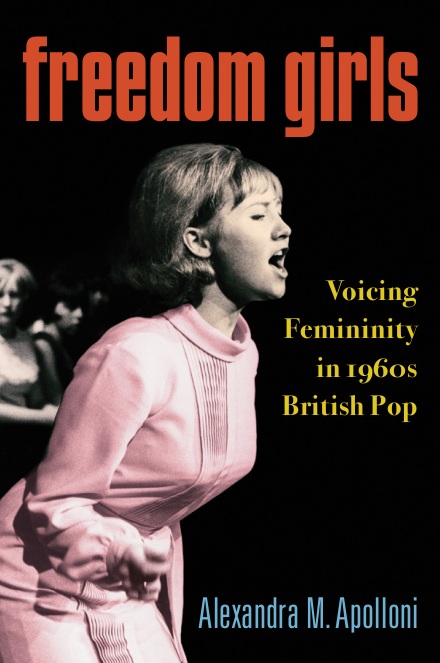Shortlisted for the Rock and Roll Hall of Fame/Pop Conference 2022 Ralph J. Gleason Music Book Award
Available from:
- Oxford University Press
- Bookshop.org
- All major book and ebook retailers (but support your local indie bookshop if you can!)
Freedom Girls: Voicing Femininity in 1960s British Pop shows how the vocal performances of girl singers in 1960s Britain defined-and sometimes defied-ideas about what it meant to be a young woman in the 1960s British pop music scene. The singing and expressive voices of Sandie Shaw, Cilla Black, Millie Small, Dusty Springfield, Lulu, Marianne Faithfull, and P.P. Arnold, reveal how vocal sound shapes access to social mobility, and consequently, access to power and musical authority. The book examines how Sandie Shaw and Cilla Black’s ordinary girl personas were tied to whiteness and, in Black’s case, her Liverpool origins. It shows how Dusty Springfield and Jamaican singer Millie Small engaged with the transatlantic sounds of soul and and ska, respectively, transforming ideas about musical genre, race, and gender. It reveals how attitudes about sexuality and youth in rock culture shaped the vocal performances of Lulu and Marianne Faithfull, and how P.P. Arnold has re-narrated rock history to center Black women’s vocality.
Freedom Girls draws on a broad array of archival sources, including music magazines, fashion and entertainment magazines produced for young women, biographies and interviews, audience research reports, and others to inform analysis of musical recordings (including such songs as “As Tears Go By,” “Son of a Preacher Man,” and others) and performances on television programs such as Ready Steady Go!, Shindig, and other 1960s music shows. These performances reveal the historical and contemporary connections between voice, social mobility, and musical authority, and demonstrate how singers used voice to navigate the boundaries of race, class, and gender.
Table of Contents
Introduction: Vocal Manners for Moderns
Part I: Ordinary, Extraordinary Voices
Chapter 1: Chart Chicks and Gear Girls: The Limits of Mod Femininity
Chapter 2: A girl in a million, just like a million”: Sandie Shaw and Ordinary Girlhood
Chapter 3: Sounding Like Liverpool: Region, Memory, and Cilla Black’s Accent
Part II: Voicing Difference
Chapter 4: England meets Jamaica’s Lollipop Girl: Millie Small, Voice, and Migration
Chapter 5: Race, Self-Invention, and Dusty Springfield’s Voice
Part III: Voice, Age, and Sex
Chapter 6: The Last Remaining Virgin in London: Lulu, Whiteness, and Youth
Chapter 7: Sex, Freedom, and Marianne Faithfull’s Voice at the Twilight of the Sixties
Chapter 8: Remembering Rock and Roll with P.P. Arnold
